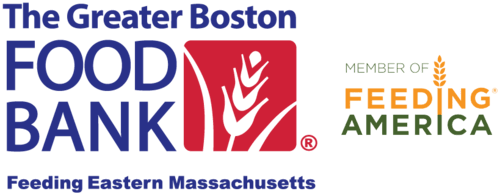Networking for Nourishment
A Model Partnership | Part Two: Action
Networking for Nourishment
The pandemic sparked an epic partnership between the YMCA of Greater Boston and The Greater Boston Food Bank, two organizations with the same mission – to provide food for those in need during a deadly pandemic that changed the world as we knew it.
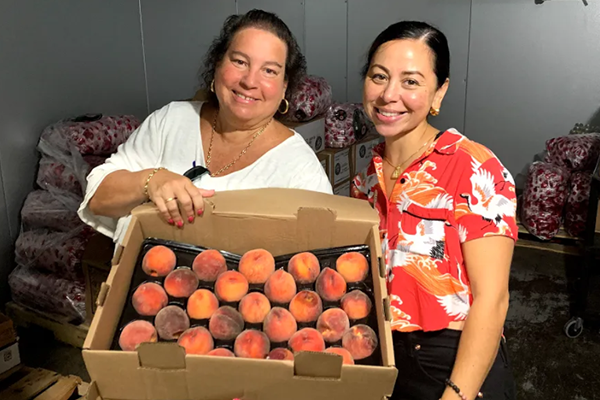
With an emphasis on the connection between success and full bellies, the Boston YMCA Food programs have supplied thousands of meals and snacks to children enrolled in their summer and vacation programs and after-school programs for years.
When the pandemic hit, YMCA CEO James Morton supported the plan to focus on food: “We closed our branches on a Friday, and by Monday we were providing food and basic childcare for the children of essential workers. We are blessed to be part of the solution.”
Wendy Zinn, Chief Social Responsibility Officer, is a 33-year veteran of the YMCA and knows many people around the city, but this was networking at a whole different level.
“Once we began, we just kept meeting more people who wanted to help, and that allowed us to be innovative. I knew that once they committed, they would follow through and deliver on their promise,” she says. “It was a remarkable series of connections that made it all happen.”
At the outset, the Y was receiving truckloads of pallets of food from GBFB at their Huntington Avenue headquarters in the heart of Boston.
Around this time, Zinn began crafting a first-time partnership with The Ride, MBTA’s paratransit service providing door-to-door, shared-ride transportation to eligible people who can’t use the subway, bus, or trolley due to temporary or permanent disability. YMCA employees and volunteers would spend hours loading and unloading, lugging full bags of groceries through corridors and up and down stairwells of the Huntington Ave headquarters. Then, utilizing The Ride and their drivers, groceries were delivered to homes and distribution sites across the city so that families in need were never left in want.
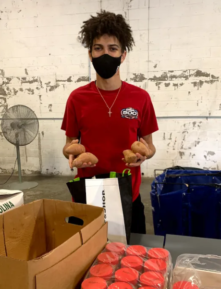
The YMCA continued to adapt, utilize local partners, and figure out how to get food into the hands and homes of our neighbors in need. The network, led by the YMCA and GBFB, kept growing organically as more people and organizations came forward to help. Staying true to their mission, during the summer of 2020, when youth employment opportunities largely evaporated, the YMCA hired 440 teens to manage and staff food distribution sites.
At its height during the pandemic, the YMCA-led emergency food partnership with The Greater Boston Food Bank was delivering more than 5,000 full grocery bags a week to over 125 locations, including “grab-and-go” meal sites and deliveries directly to people’s homes. Each 10-12 pound bag was stocked with fresh produce and staples – sufficient to feed an average family for a couple of days.
The program has continued to grow exponentially. The City of Boston transferred $100,000 to the YMCA to pay for the emergency food. The YMCA continued to develop new partnerships, including the core relationship with GBFB as the essential food resource.
First, the Chinese Progressive Association mobilized suddenly unemployed restaurant workers to Huntington Avenue for six months to pack the bags, thus providing a paycheck to workers in need. Next, The Ride, the Mayor’s Office of Food Access, SNAP Chefs from Dorchester, the DCR, the Jewish Vocational Service, City Fresh Food for prepared meals, and Breaktime –– a workforce development program for homeless young adults all got involved. The YMCA re-purposed its childcare vans into delivery trucks. They rented refrigerated trucks and storage racks. The roster of partners continued to grow, more employees were hired, and the outreach spread.
The only problem now was that the food program kept outgrowing its location and capacity.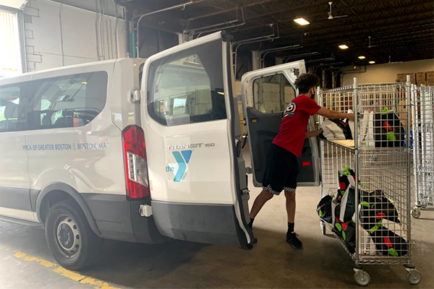
From the Huntington Avenue headquarters, they next moved to the DCR site in Roxbury. And then to the Hilton Hotel at Logan Airport. “They had no business with all the flights grounded. The hotel’s general manager was a YMCA Board Member, and when I asked, he said, ‘Why not?’ So, we set up shop in their main restaurant for six months,” the ever-entrepreneurial Zinn recalls. Another advantage: the Y was able to hire some of the hotel’s employees instead of laying them off.
Then, a stroke of luck occurred in April of 2021: the YMCA secured a warehouse in industrial East Boston. Cargo Ventures, the company that owns and operates the building, offered it at no cost to the YMCA – given the slowdown in travel and shipping, the space was sitting empty. The company had learned of the need and stepped up with the perfect space with a spacious parking lot and easy access for truck delivery.
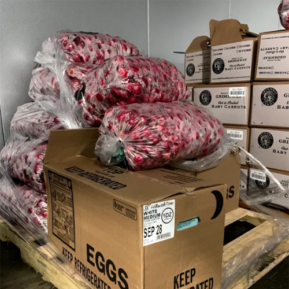
With the space now available, The YMCA has been able to step up their game: GBFB helped the YMCA purchase an industrial, walk-in refrigerator to store produce and other non-shelf-stable food products. Health and hygiene products are also available with soap and cleaners, masks and sanitizer, feminine hygiene supplies, and more donated by local nonprofits.
Now, instead of flights of stairs on Huntington Avenue, trucks, large and small, come to the warehouse to collect bags packed for distribution. The YMCA is no longer doing home deliveries, but it works with over thirty community-based organizations to deliver food to close to 100 locations. Two new refrigerated trucks are on order with an early fall delivery date. While the need has receded from its lockdown levels, demand continues steady at approximately 3,700 bags of food per week.
Since March 16, 2020, the YMCA of Greater Boston has delivered more than 3.7 million meals and counting at no cost to the recipients and with no questions asked.
April Strack, who manages the Greater Boston YMCA warehouse in East Boston, says, “GBFB has been an amazing partner. It’s been an extraordinary experience working with them and seeing how much we can make a difference together. Food goes out every day, and every day the bags and produce offered are different. My warehouse team and I work to give families variety and to be sensitive to food preferences as they vary by neighborhood.”
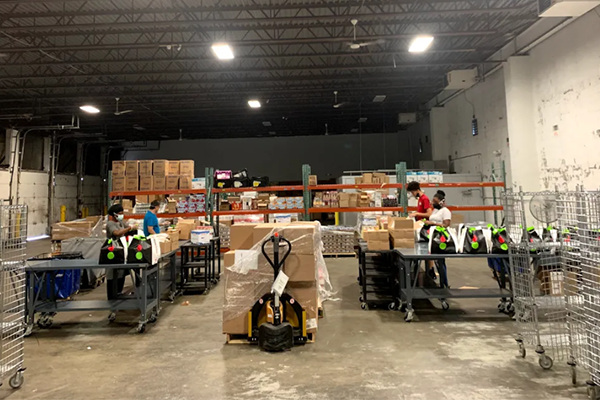
What’s in the future?
The need for food and the partnerships that support it will continue. The good news is that the YMCA has a firm long-term commitment to keep the warehouse from its owners. Jacob Citrin, the CEO and founder of Cargo Ventures says, “We owned the space, but we saw that giving it to the YMCA could make a huge difference to the community. I would hope that the need for space would go away, but if the need is there, we are proud to provide the space for as long as they need it.”
Wendy is hopeful for the future as they continue to adapt and move forward during this time. She hopes for the YMCA to re-fit buses and vans into mobile markets that can deliver food to Boston’s schools at pick-up time.
“I’d like people to be able to choose their own food,” she says. “It’s a dignity thing.”
The partnership, inaugurated with the critical and creative help of GBFB, and nurtured all over the city, will be there to make that next vision a reality.
